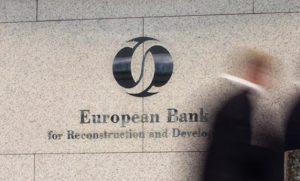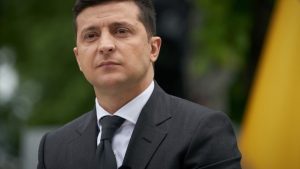
JSC Ukrzaliznytsia for the upcoming Independence Day of Ukraine will launch additional high-speed trains No. 224/223 Odesa-Kyiv and No. 168/167 Lviv-Odesa.
According to the company’s press service, the trains will be launched due to an increased demand for passenger transportation services on holidays.
Train No. 224/223 will transport passengers between Odesa and Kyiv on August 22 and 24.
Train No. 168/167 will transport passengers between Lviv and Odesa on August 22, 24, 26, 28 and 30.
KYIV, LVIV, ODESA, TRAIN, UKRZALIZNYTSIA

The European Bank for Reconstruction and Development (EBRD) has provided Olam International Ltd. (Singapore) with a $200 million loan to finance the company’s working capital needs in Ukraine, Turkey, Egypt, Georgia and Poland.
“The EBRD loan will finance purchases of agricultural commodities such as hazelnuts, dry dairy products, grain and onions in selected countries of operation. Local subsidiaries of the company will take on the processing, storage and distribution of these goods,” the bank said on its website.
“The European Union and the TaiwanBusiness-EBRD Technical Cooperation Fund will provide donor support for the development of new methodologies and processes for climate-related risk management and stress testing in Egypt and Turkey,” it says.
Olam International is a major food and agricultural products manufacturer headquartered in Singapore.
Olam International Ltd. 53.4% is owned by Temasek Holdings, 17.4% by Mitsubishi Corporation, 7% by Kewalram Chanrai Group and 6.3% by the Olam management.
Olam Ukraine LLC was founded in 2005 and is currently the leading supplier of cocoa beans and cocoa products to large local confectioners, as well as a major exporter of grain and milk powder products.

President of Ukraine Volodymyr Zelensky advocates the adoption of a law on inland waterway transport, which will allow the development of a cheap type of freight transportation and save Ukrainian highways.
During a conversation with media representatives in Kherson region, the president noted that now the state is investing billions of hryvnias in the repair and construction of highways, and then overloaded trucks move along them and destroy the roadbed.
“The country should have several routes of transportation. Water transport is one of the cheapest types of transportation,” Zelensky said.
According to the head of state, the draft law on water transport is under consideration in the profile committee of the Verkhovna Rada.
“I am sure that we will vote this law, and this type of transport, which we really need, will work. And we will develop shipping and transportation,” Zelensky stressed.
The adoption of the law will contribute to an increase in freight traffic of 35 million tonnes per year, saving roads and UAH 1 billion for road surface repairs over four years. The document, if adopted, will provide constant funding for safe river infrastructure, stimulate shipbuilding and the restoration of Ukrainian enterprises and jobs, and also open the admission of vessels under a foreign flag to the inland waterways of Ukraine, which will contribute to the development of international trade.

The Northern Mining and Processing Plant (Northern GOK, Kryvy Rih, Dnipropetrovsk region), which is the part of the Metinvest Group, will invest UAH 2.3 billion in environmental protection measures in 2020.
Metinvest Kryvyi Rih said on Facebook on Thursday, August 20, that Northern GOK continues seeking effective ways of environmental protection.
“This time peat hydroxide reagent was successfully tested during the blasting operations in the mine. Earlier, spraying of the reagent in the Hannivsky mine helped to reduce dusting by 30% and gas emission by 70%,” it said.
As reported, Metinvest plans to invest UAH 3.1 billion in the modernization and overhauls of equipment and construction of strategic facilities at Northern GOK in 2020.
Northern GOK is a part of the Metinvest Group, the main shareholders of which are JSC System Capital Management (SCM, Donetsk) (71.24%) and Smart Holding group of companies (23.76%).
The holding company of the Metinvest Group is Metinvest Holding LLC.

PJSC ArcelorMittal Kryvyi Rih (Dnipropetrovsk region) has passed 50 million tonnes of smelter slag to state-run enterprise New Technologies of Road Construction.
The metallurgical complex said on Thursday that after processing into slag crushed stone and sand smelter slag will be used for road construction and repairs under the Big Construction state program.
“We want Ukravtodor and local authorities to use more actively smelter slag provided by ArcelorMittal Kryvyi Rih the characteristics of which fully comply with the national standards of road construction. It can be used in the base layer and as fine and coarse aggregate for concrete and asphalt roads,” the enterprise’s chief engineer, Andriy Babenko, said.
He also noted that active use smelter slag will improve the quality of road surface, as well as resolve the environmental problems related to accumulation and disposal of waste.
“Moreover, this is an economically reasonable solution, as road construction using such a technology will cost the government less than the use of natural materials,” Babenko said.
According to ArcelorMittal Kryvyi Rih, Ukravtodor plans to use around 500,000 cubic meters of smelter slag for road construction in 2020. As of the middle of August, it has used more than 100,000 cubic meters of smelter slag in Kharkiv, Donetsk, Dnipropetrovsk and Zaporizhia regions.

As of the middle of August, Ukraine International Airlines (UIA) transported 113,345 passengers and 390,185 tonnes of cargo since the resumption of flights in the middle of June.
“Starting from mid-June until mid-August, we carried out around 1,238 regular and charter flights, of which 86% departed on schedule,” UIA President Yevhen Dykhne said on Facebook.
He also recalled that in the first half of the year the UIA transported around 1 million passengers, while last year this index reached almost 4 million.
“This means that aviation in fact has to start from zero, and the interest and persistence of employees alone are worthy of attention,” Dykhne said.
He also said that the airline has a range of plans for autumn, adding that he expects the company’s results would only grow.
As reported, earlier the UIA reduced its August flight schedule due to the extension of a ban on entering the Schengen zone for Ukrainian citizens by the EU.